Leaders Of UAE, Egypt And Bahrain Meet After Houthi Attacks
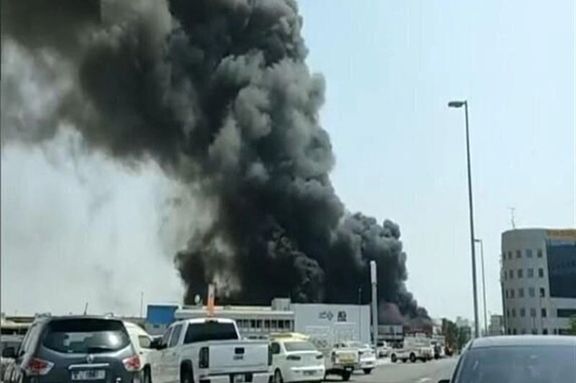
The leaders of the United Arab Emirates, Egypt and Bahrain met in Abu Dhabi after two attacks by Yemen's Houthi rebels targeted the city.

The leaders of the United Arab Emirates, Egypt and Bahrain met in Abu Dhabi after two attacks by Yemen's Houthi rebels targeted the city.
The state-run WAM news agency released the footage late Wednesday of the meeting. It saw Abu Dhabi's powerful Crown Prince Sheikh Mohammed bin Zayed Al Nahyan, Dubai ruler Sheikh Mohammed bin Rashid Al Maktoum, Egypt's President Abdel Fattah el-Sissi and Bahrain King Hamad bin Isa Al Khalifa all meet in Abu Dhabi.
Iran-backed Houthis launched a drone and missile attack on Abu Dhabi January 17, killing three foreign workers and launched a ballistic missile on January 24 that was intercepted by air defenses.
A communique released after the meeting said the leaders believe the Houthi "attacks pose a serious threat to regional and international security and stability and violate all international laws and norms."
These were rare attacks against the UAE, while Houthis have regularly targeted Saudi Arabia. UAE reduced its direct involvement in the Yemen conflict and is supporting local forces against the Hothis who have been making advances.
A Saudi-led coalition has been battling the Iranian-backed Houthis since March 2015 in a war that is seen as a proxy battle by the Islamic Republic against Persian Gulf Arab states.
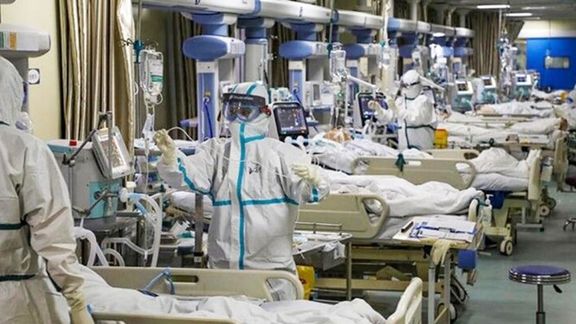
The Omicron variant is fast spreading across Iran, with an official from Iran’s Covid-19 taskforce, Hamidreza Jama’ati, predicting a peak in the next few weeks.
Another taskforce member, infectious diseases expert Payam Tabarsi, told ILNA news agency Wednesday that cases were increasing 40-50 percent daily.
Tabarsi noted it was too soon to say fatalities would be lower from Omicron, first reported in Iran December 19, than from earlier variants as most people infected at the beginning of each peak are young rather than the elderly or those with underlying conditions.
Cases reached 12,000 Wednesday, for the 24-hour period ending noon, up from 9,000 in the previous 24 hours, but the number of fatalities has remained in lower double-digits, well below the 709 peak of August 2021. Around 15 million Iranians have received a booster shot, and the government has announced plans to vaccinate nine to 12 year-olds.
While preliminary evidence worldwide suggests Omicron is less deadly than earlier variants it is also more contagious. The World Health Organization (WHO) this week warned of the danger of further variants and expressed scepticism at those countries, including the United States and the United Kingdom, lifting most restrictions.
Iran − which already has the highest official number of deaths and cases in the Middle East, 132,300 with 63 percent fully vaccinated, compared to 22,400 in Egypt with 26 percent fully vaccinated − is about to open schools. The government has also announced plans to hold celebrations, including rallies, for the anniversary of the 1979 revolution.
Numbers, fatalities
There have been many reports in Iran that there are far more deaths from Covid than officially recorded. In August, Kourosh Halakouei-Naeini, an epidemiology professor at Tehran University of Medical Science, claimed in Javan newspaper that the real figure was seven times higher – although the report served the principlist paper’s aim of undermining then president Hassan Rouhani.
Last week, BBC Persian suggested there had been at least 300,000 fatalities, while the United States think-tank the Atlantic Council published an article in December arguing deaths from Covid were 2.5 times higher than numbers announced by the health ministry.
The Albania-based opposition Mujahideen-e Khalq (MEK) claimed Tuesday that deaths in Iran from Covid were approaching 500,000. The group released a breakdown across 547 cities but gave no source nor explanation of methodology used.
Iranians in social media criticized Supreme Leader Ali Khamenei for banning American and British-made vaccines in early 2021, which they say increased infections and deaths last summer with the Delta surge. There were also suggestions that authorities played down the threat from Covid back in 2020 so as not to deter voting in the February parliament election and because Qom, home to many religious seminaries, was an early hot-spot.
As in many other countries, the management of the pandemic became a stick by which critics sought to beat the government, especially in Iran the health minister Saeed Namaki and Rouhani. By contrast, an increasing speed of vaccinations under President Ebrahim Raisi, who took office in August, has been widely highlighted by his conservative supporters.
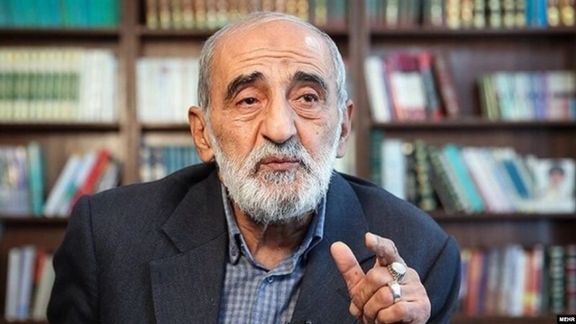
Nearly all 40 newspapers in Tehran carried welcoming reports about the idea of direct talks with the United States on Wednesday, that has grabbed the headlines.
Foreign Minister Hossein Amir-Abodllahian first hinted at the possibility on Monday and Supreme Council of National Security chief Ali Shamkhani echoed the same idea on Tuesday.
The exceptions were the hardliner Kayhan which is linked to Supreme Leader Ali Khamenei's office and ultraconservative Vatan Emrooz, a Paydari Party mouthpiece, which is the dominant hardliner group in the parliament.
The kayhan harshly criticized Amir-Abodollahian and Shamkhani for their support for direct talks with the Washington.
Last week, Kayhan and IRGC-linked Tasnim news agency had lashed out at Amir-Abdollahian for his support for a balanced foreign policy which meant having ties with the United States as well as Russia and China.
Vatan Emrooz totally had ignored the development while IRGC daily Javan avoided criticizing the foreign minister and the change was noticed by many social media activists in Iran.
The idea of direct talks was most recently brought up by US Special Envoy for Iran Robert Malley who responded to the Iranian side's call for a guarantee that future US governments will not pull out of a nuclear deal with Iran. Malley suggested that major US companies can be prompted to invest in Iran and in that case, they will prevent a US pull out from a new agreement.
Nonetheless, it was Khamenei himself who first mentioned the possibility of direct talks with the United States in a January 9 speech in which he showed the first public sign of his readiness for a compromise on the nuclear deal. His move was similar to his "heroic flexibility" speech in 2013 when he first agreed to negotiations with the United States. He said on January 9, "Negotiations with the enemy at a certain juncture does not necessarily mean surrender".
In a report that was published by Iran Diplomacy website on Wednesday, conservative commentator Jalal Khoshchehreh told the website that softening Iran's positions on holding direct talks with America was a change that followed President Ebrahim Raisi's visit to Moscow last week. Raisi himself, however, implied on live TV Tuesday night that direct talks are possible only if the United States lifts the sanctions on Iran.
As a result, Iranian newspapers came out Wednesday morning with three different messages about Tehran's approach to direct talks with Washington: The good, the bad and the ugly: Khamenei and Amir Abdollahian approving of direct talks with some hesitation, Raisi pending direct talks on the lifting of the sanctions, and Kayhan absolutely ruling out direct negotiations under any circumstances.
In a prominent headline on its frontpage on Wednesday the Kayhan said that "Direct talks is the enemy's trick to evade lifting the sanctions. Hossein Shariatmadari, the daily's firebrand editor wrote in his "brotherly advice to the foreign minister and security chief" that although they might be looking for water, they are misled to drown themselves in a mirage. Shariatmadari said he is worried that support for direct talks with the United States might disappoint the regime's devoted zealot supporters.
The anti-US editor then resorted to a piece of poetry from Iran's great poet Hafiz and quoted the 14th century mystic as saying: "This country is far from water, beware of the demons who lead you to mirage."
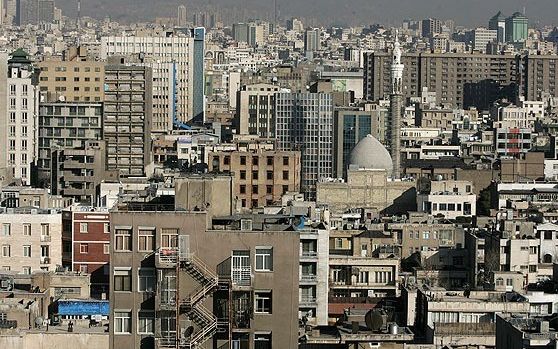
Rents in the capital Tehran have increased by more than 50 percent in one year amid a similar rate of inflation, surveys by the Central Bank of Iran indicate.
According to a report published on Wednesday, Tehran’s rent index in December was 50.7 percent higher in comparison with the corresponding figure for the previous year.
The average price of one square meter (11 sq feet) of a residential unit was estimated at about 330 million rials or about $1,200 in today’s exchange rate, which makes it practically impossible for an ordinary resident of the capital to earn enough money to buy any property with an average salary of less than $200 a month.
In fact, prices have remained constant since 2018 if calculated in US dollars, but Iranians earn rials, which has nosedived against other currencies. Real estate has remained a safe heaven to protect capital from devaluation.
Theannual inflation rate stood at 42.4 percent during December 21-Jaunuary 20. The annual rate is calculated based on a basket of prices for the year ending in each month compared to the previous 12 months.
Iran’s currency has fallen eightfold since early 2018, due to US sanctions while inflation has skyrocketed. Millions of working Iranian are now categorized as poor, with the middle class shrinking.
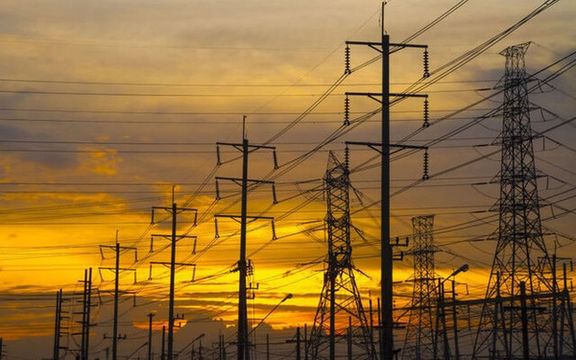
Saudi Arabia and Iraq have signed a memorandum of understanding on January 25 to connect their electricity grids, which can supply much-needed power to Iraq.
Baghdad relies heavily on Iranian electricity imports, while in addition, one third of its electricity comes from thermal power plants which use Iranian natural gas.
However, during last few years, Iran has always cut gas exports to Iraq in winters and curbs electricity deliveries in summers due to its own domestic shortages.
Iran has one of the cheapest energy prices in the world in what amounts to a huge subsidy of tens of billions of dollars for its citizens, who as a result have little incentive to save. Iran also suffers from lack of investments and technology to maintain its falling gas production. Some estimates say up to $40 billion is needed to upgrade production platforms.
Iraq says gas flows from Iran have decreased dramatically from about 50 million cubic meters per day (mcm/d) to around 8 mcm/d in recent weeks, as Iranian officials scrambled to feed power plants and prevent blackouts in the country.
Iran even cut gas exports to Turkey last week, forcing manufacturers to shut down or reduce production.
Perhaps the most important aspect of the Iraqi and Saudi deal is the fact that all Gulf Cooperation Council members (Oman, Qatar, UAE, Bahrain, Kuwait and Saudi Arabia) have already connected their electricity networks together, while Iraq completed its grid connection to Kuwait in November 2021.
This would allow Saudi Arabia to immediately deliver electricity to Iraq through Kuwait, without waiting for connection of its direct electricity grid to Iraq’s.
Saudi Arabia had also signed an electricity export memorandum of understanding with Iraq in 2018 to deliver 3,000 MW of solar power at $21 per one megawatt hour. The volume of this deal is three times larger than Iran’s electricity exports to Iraq and the price is only 30% of Iran’s rate for Baghdad.
Iraq also has other options to become independent from Iranian energy. It has signed several multi-billion contracts with international companies like Germany’s Siemens and United States’ General Electric to boost its electricity generation as well as natural gas production.
Regarding the dramatic growth in oil prices which have boosted income for Iraq’s government, it is expected that development of these projects would accelerate.
During the past 10 years, Iraq’s annual electricity generation capacity and gas production modestly increased by 12.3% and 4.8% respectively.
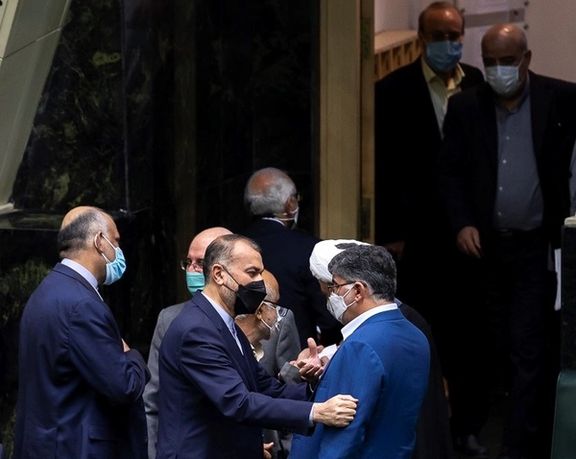
Iran’s Foreign Minister Hossein Amir-Abdollahian attended parliament on Wednesday to reassure lawmakers that so far, no direct talks have taken place with the United States.
The possibility of direct talks between Washington and Tehran has been a daily subject of media reports and speculations, as Iranian officials have changed their tone from past categoric rejections.
Mahmoud Abbaszadeh Meshkini, the spokesman for the National Security and Foreign Policy Committee of the parliament, said that Hossein Amir-Abdollaian attended the committee’s meeting to reassure MPs that no direct dialogue has taken place between the Iranian and US negotiating teams so far.
According to Meshkini, the foreign minister also answered questions about the ongoing talks to revive the 2015 nuclear deal, emphasizing that Iran is focused on the issue of guarantees and verifications for the removal of sanctions.
Amir-Abdollaian told lawmakers that some progress has been made but there are still issues that need to be discussed further.
Meshkini said that the West seeks to get concessions from Iran but only a win-win agreement is acceptable by the Islamic Republic.
“Iran wants a lasting agreement, and if it is permanent, it will be better”, Meshkini added, noting that the other side wants a temporary deal so they can withdraw from it whenever they want.
Tehran says it will not consider any interim arrangement, but recent reports suggest it is mulling the idea of direct negotiations with Washington.